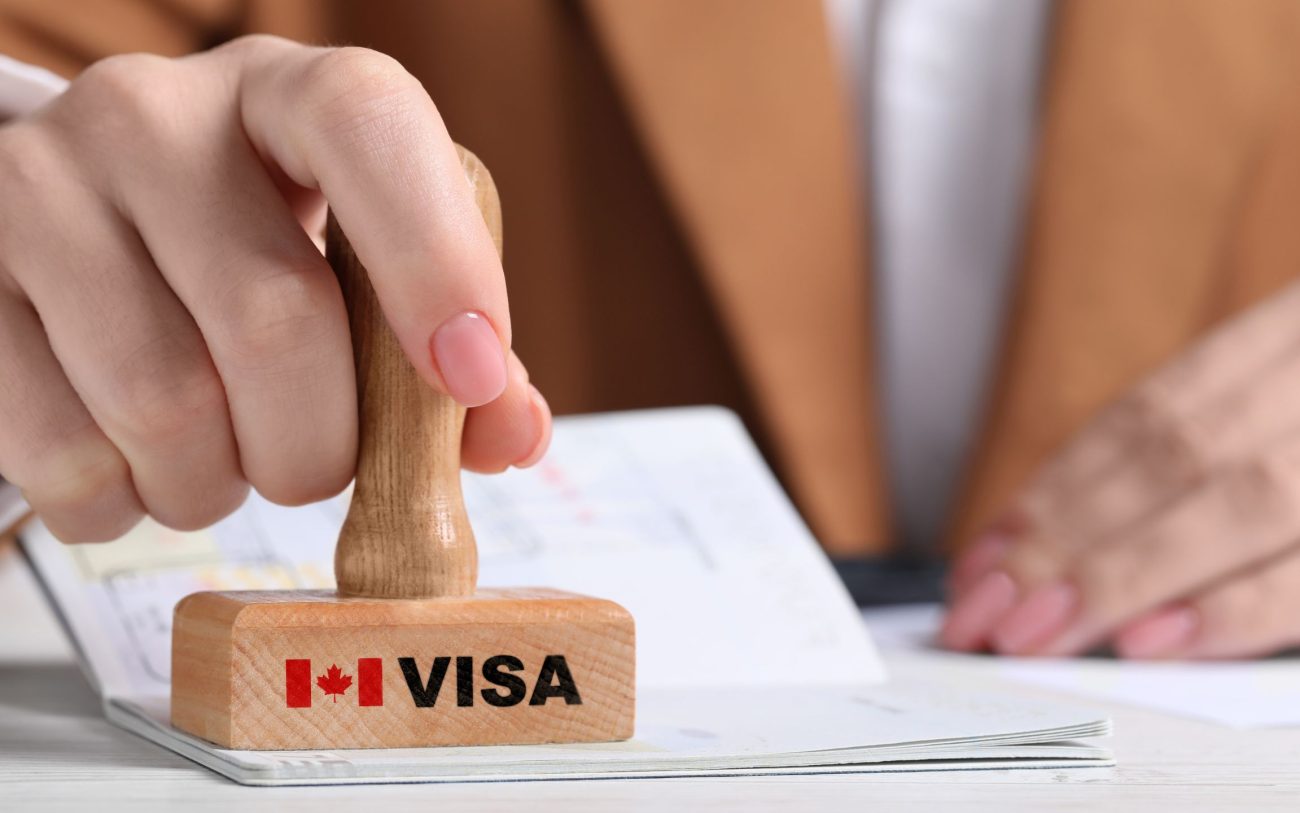
Canada Visitor Visa – Meaning, Eligibility, and How to Apply
Dreaming of witnessing the Canadian Northern Lights dance across the night sky or exploring the bustling streets of Toronto? A Canadian Visitor Visa, also known as a Tourist Visa, can be your key to unlocking these experiences and more. This visa allows you to enter Canada for temporary stays, typically up to 6 months, for various purposes like tourism, visiting family and friends, or attending short-term programs.
In this blog, we’ll look into the eligibility criteria, application process, and valuable tips to help you navigate your Canadian Visitor Visa journey smoothly.
What Is Canada Visitor Visa?
The Canada Visitor Visa, also known as a Temporary Resident Visa, unlocks the door to exploring this captivating country. It empowers you to visit Canada for various purposes, including:
- Immerse yourself in Canadian tourism: Experience the awe-inspiring landscapes, vibrant cities, and rich culture.
- Connect with loved ones: Visit family and friends residing in Canada and strengthen your bonds.
Understanding Entry Options: Types of Canadian Visitor Visas
1. Single Entry Visa:
- Allows entry to Canada once for the duration of your authorized stay.
- Ideal for those with a specific, one-time visit planned.
2. Multiple Entry Visa:
- Grants permission to enter and leave Canada multiple times during its validity period.
- Perfect for frequent travelers or those with ongoing reasons to visit Canada.
Important Note:
- Applicants are automatically considered for multiple entry visas unless specific circumstances warrant a single entry visa.
- Multiple entry visas typically allow stays of up to six months per visit, with a maximum validity of up to 10 years.
- Holders of valid study permits or work permits receive a visitor visa (usually multiple entry) to enter Canada and collect their permits.
Who Needs a Visitor Visa?
- Most foreign nationals: If you’re not a Canadian citizen, permanent resident, or exempt from visa requirements, you’ll need a visitor visa to enter Canada. This includes individuals visiting for tourism, leisure, or even business purposes (excluding temporary foreign workers).
- Expired Permanent Residents: Canadian permanent residents with expired permanent resident cards cannot use a visitor visa to re-enter the country. They must apply for a Permanent Resident Travel Document (PRTD).
- Dual Citizens: Even if you hold dual citizenship, one including Canada, you cannot enter on a visitor visa. You must travel on a valid Canadian passport.
Who Doesn’t Need a Visitor Visa?
- Canadian Citizens: As a Canadian citizen, including those with dual citizenship, you don’t require a visitor visa. You can enter using a valid Canadian passport.
- Visa-Exempt Countries: Citizens of certain countries are exempt from visa requirements and can enter Canada using an Electronic Travel Authorization (eTA). You can check the official IRCC website (https://www.canada.ca/en/immigration-refugees-citizenship/news/2023/06/eligible-travellers-from-13more-countries-now-qualify-for-visa-free-travel-to-canada.html) to see if your country is listed.
Additional Considerations:
- Business Visitors: If you’re coming to Canada for business purposes but are not classified as a temporary foreign worker, you may require a business visitor visa. The specific requirements depend on your activities and the duration of your stay.
Remember: It’s crucial to verify your visa requirements well in advance of your trip. This ensures a seamless entry process and avoids any potential delays or issues at the border. The official Canadian government website (https://www.canada.ca/en/immigration-refugees-citizenship/services/application.html) provides comprehensive information and resources regarding visitor visas and other travel documents.
Visa-Exempt Countries: Who Can Visit Canada Without a Visa?
While most foreign nationals need a visa to enter Canada, there are exceptions. This section clarifies who is exempt from the visa requirement and what documents they need for entry.
Who is Visa-Exempt?
Citizens of certain countries have agreements with Canada that allow them to visit for up to six months without a visa. These countries are considered visa-exempt. You can find a complete list of visa-exempt countries on the official Canadian government website https://www.canada.ca/en/immigration-refugees-citizenship.html.
Travel by Air:
- Visa-exempt countries: These individuals require a valid Electronic Travel Authorization (eTA) to fly to or transit through a Canadian airport. Apply for an eTA online at least 72 hours before your flight https://www.canada.ca/en/immigration-refugees-citizenship/services/visit-canada/eta.html.
- United States: U.S. citizens do not need an eTA or visa for air travel to Canada, as long as their stay is less than six months.
Travel by Land or Sea:
- Visa-exempt countries (except the United States): These individuals only need a valid passport issued by their visa-exempt country.
- United States: U.S. citizens can enter Canada by land or sea with just a valid U.S. passport, as long as their stay is less than six months.
Special Case: U.S. Permanent Residents (Green Card Holders)
- Regardless of their citizenship, U.S. permanent residents (Green Card holders) are visa-exempt.
- They require an eTA to fly to or transit through a Canadian airport.
- They need to present a valid Green Card and passport upon entering Canada.
Remember: Even if you are visa-exempt, you may still need to meet other entry requirements, such as having sufficient funds and a return ticket. It’s always advisable to check the latest information from official Canadian government sources before your trip.
How to Apply for your Canadian Visitor Visa
There are three main ways to apply for a Canadian visitor visa:
- Online: The online application process is the most efficient and convenient option for many applicants. You can access the application form and instructions through the IRCC website.
- Paper application: You can download the paper application form and mail it along with the required supporting documents to the nearest Visa Application Center (VAC).
- In-person application: You can apply in person at a VAC or a Canadian embassy or consulate in your home country.
Important Note: Regardless of the application method, each family member, including dependent children, needs to submit a separate application. However, you can submit all the applications together.
Additional Considerations:
- Biometric information: Depending on your nationality, you might be required to submit your fingerprints and photograph as part of your application.
- Processing times: Processing times for visitor visa applications can vary depending on various factors. It’s crucial to check the IRCC website for the latest estimates.
By understanding the requirements, eligibility criteria, and application process, you can increase your chances of obtaining a Canadian visitor visa and embarking on your Canadian adventure. Remember, this blog post serves as a general overview, and it’s recommended to always refer to the official IRCC website for the most up-to-date and comprehensive information.
Extending Your Stay in Canada: Visitor Visa Information
Visitor visas allow foreign nationals to stay in Canada for up to six months at a time. This applies to both single-entry and multiple-entry visas. Once this period ends, your authorized stay expires, and you must depart from Canada.
Extending your stay:
- If you wish to stay longer than six months, you must apply for an extension before your current visitor status expires.
- It’s crucial to submit your application at least 30 days before your current status reaches its end date.
Important note:
- If your visa expires while your extension request is being processed, you may be able to stay in Canada under implied status while awaiting the decision.
Alternative option:
- If eligible for one of Canada’s immigration programs, you can also explore applying for permanent resident status.
Why Visitor Visas Get Denied: Understanding the Common Reasons
Applying for a visitor visa can be a complex process, and unfortunately, many applications are rejected each year. Understanding the common reasons for visitor visa denials can significantly increase your chances of success.
Here are some of the most frequent reasons why visitor visas are denied:
- Incomplete documentation: Ensure you submit all the required documents and meet the specific formatting and translation requirements outlined by the embassy or consulate.
- Financial instability: Demonstrate sufficient financial resources to cover your entire stay without relying on others for support. This can include proof of employment, bank statements, or sponsorship letters.
- Criminal background: Serious criminal offenses or a history of immigration violations can lead to visa denial.
- Health concerns: Certain health conditions might require additional medical examinations or pose security risks, potentially leading to visa rejection.
- Unclear travel intentions: A well-defined itinerary and clear purpose for your visit are crucial. Vague plans or inconsistencies between your application and intended activities can raise red flags.
- Weak ties to the home country: Strong ties to your home country demonstrate that you have compelling reasons to return after your visit. This could include employment, property ownership, or family ties.
- Past travel history problems: Overstaying previous visas or violating immigration laws in other countries can significantly impact your current application.
- Misrepresentation: Providing false or misleading information in your application is a serious offense and can result in permanent visa ineligibility.
- Overstaying records or illegal status: If you have previously overstayed a visa or entered a country illegally, your application will likely be denied.
Enhanced Eligibility Criteria for Canada Visitor Visa
The Canadian government offers various types of Temporary Resident Visas (TRVs), each with specific eligibility criteria. Here’s a breakdown of the general requirements for most TRVs:
Basic Requirements:
- Age: Be at least 18 years old at the time of application.
- Passport: Hold a valid passport from your home country with at least two blank pages (excluding the back cover) and valid for at least six months beyond your intended stay in Canada.
- Language: Submit translated and certified copies of all documents not in English or French.
- Financial Means: Demonstrate sufficient financial resources to support yourself and any dependents during your stay in Canada. This includes proof of income, bank statements, or prepaid travel arrangements.
- Medical Exam: Undergo a medical examination if requested by a Canadian visa office.
- Intention to Leave: Convince the immigration officer that you intend to leave Canada at the end of your authorized stay and have no plans to work or study unless authorized.
- Criminal History: Possess a clean criminal record and be admissible to Canada.
Additional Considerations:
- Visa Application Fees: Pay the required visa application and processing fees.
- Biometrics: Provide fingerprints and a digital photograph as part of the application process.
- Immigration Status: Submit copies of your current immigration status documents, if applicable.
- Visa Application Center (VAC) Consent: Complete and sign the VAC consent form, authorizing the center to handle your application on your behalf.
Note: These are general requirements, and specific criteria may vary depending on the type of TRV you apply for. It’s crucial to research the specific requirements for the TRV that aligns with your purpose of visit to Canada.
Canada Tourist Visa Requirements:
Before applying, remember:
- You may be eligible for an Electronic Travel Authorization (eTA) instead of a visa, depending on your nationality. Check the Government of Canada website: https://www.canada.ca/en/immigration-refugees-citizenship/services/visit-canada/eta.html for details.
Required documents:
- Valid passport: Ensure your passport is valid for at least six months beyond your intended stay in Canada.
- Completed application form: Fill out the online application form accurately and completely.
- Proof of funds: Provide bank statements or financial documents demonstrating sufficient funds to cover your stay in Canada.
- Travel documentation: Submit a detailed travel itinerary or a general plan for your visit.
- Invitation letter (if applicable): If visiting family or friends, include a letter of invitation from them.
- Proof of relationship (if applicable): Provide documents like birth certificates or marriage certificates to establish your relationship with your hosts.
- Host’s immigration status (if applicable): Include copies of your host’s valid Canadian visa or permanent resident card.
- Host’s financial proof (if applicable): Your host might need to show proof of sufficient funds to support your visit.
- Declaration letter: Explain your reasons for visiting Canada and why you will return to your home country.
- Two photographs: Ensure they meet the specific requirements outlined by the Canadian government.
- Proof of employment/education: Provide documents like a resume, letter of employment, or diplomas.
- Proof of temporary stay: Demonstrate ties to your home country, such as property ownership, employment contracts, or family ties.
- Non-work/study statement: Provide a written statement confirming your intention to not work or study while in Canada.
- Police clearance certificate: Demonstrate a clean criminal record through official court documents.
- Translated documents: If any documents are not in English or French, obtain certified translations.
Additional notes:
- Application fees and processing times can vary. Refer to the official Canadian government website for the latest information.
- It’s advisable to consult with a visa consultant or immigration lawyer for personalized guidance throughout the application process.
Canada Visitor Visa FAQs:
What are the fees associated with a Canada Visitor Visa?
1. Application fee: CAD$100 per person.
2. Biometrics fee (if applicable): CAD$85 per person.
3. Total application cost: CAD$185 (including biometrics).
Note: This does not include the cost of passport processing, which can vary depending on your location.
How long does it take to process a Canada Visitor Visa?
Processing times can vary depending on your country of residence. Generally, it can take between 8 and 40 days for your application to be processed.
What is the validity period of a Canada Tourist Visa?
The validity period of your visa is determined by the Canadian Consulate on a case-by-case basis. It can range from covering your specific travel dates to the expiry of your passport. This decision is based on their assessment of your ties to your home country and your likelihood of returning after your visit.
Important: Regardless of the visa validity period, you can only stay in Canada for a maximum of 6 months per visit. You must leave the country and re-enter to obtain a new 6-month stay.
What activities are allowed with a Canada Tourist Visa?
1. Travel and tourism within Canada for less than 6 months.
2. Maintaining good financial standing during your stay.
Not allowed:
1. Obtaining Canadian documents or permanent residency.
2. Working or studying in Canada.
3. Filing for healthcare or other government benefits.
Can I bring my dependents with a Tourist Visa?
Yes, your spouse and minor children can accompany you on a Tourist Visa, but they must:
1. Apply individually with separate application fees.
2. Submit their applications together with yours at the Visa Application Center or online for family processing.
What is a Canada Visitor Visa Extension (Visitor Record)?
If you wish to stay longer than 6 months, you need to apply for a Visitor Record (extension) at least 30 days before your visa expires.
Key differences between a Visitor Visa and Visitor Record:
Visa: Attached to your passport, allows multiple entries into Canada.
Record: Independent document, not attached to your passport, allows only one stay in Canada.
Can I re-enter Canada after obtaining a Visitor Record?
No, a Visitor Record is only valid for your current stay in Canada. You cannot leave and re-enter the country with it. To re-enter, you need to apply for a new Visitor Visa.
Additionally, a Visitor Record can be used to change your status from:
1. Study permit to visitor record
2. Work permit to visitor record




